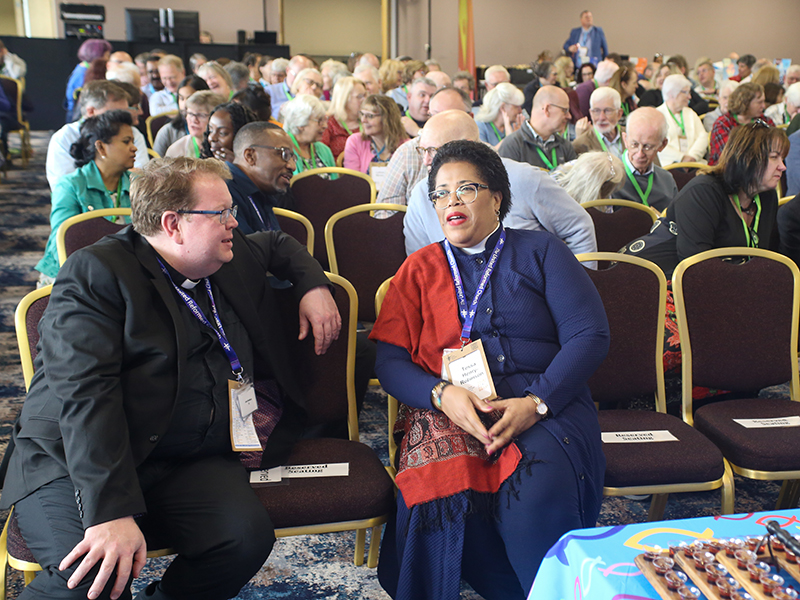Day one of the 2024 General Assembly of the United Reformed Church (URC), met at The Hayes Conference Centre in Swanwick on 12 July.
Opening the 2024 General Assembly in worship, Karen Campbell, one of the Chaplains to the Moderator of General Assembly, announced the theme for worship throughout Assembly: innovation.
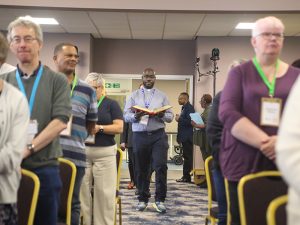
The theme is inspired by the words of Jesus throughout the sermon on the mount: “You have heard it said… but I say to you”. This, said Karen, looks back to what has been and forward to what could be.
It is not about discarding all we have been, but about embracing who we are called to be. Karen said that we are people in motion. Jesus called people, not to worship him, but to follow.
Following Bible readings about storing up treasure in heaven, and love being the greatest commandment, the chaplains, Karen and the Revd Stephen Ansa-Addo, invited Assembly to say what they treasure about the URC and about General Assembly. Members responded through QR codes and by chat to their neighbour.
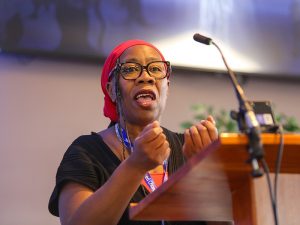
Answers that came through chat included the following:
Treasures of the URC:
- Worship
- Everyone’s the same
- Everybody’s different
- Openness
- Breaking barriers
- Inclusion
Treasures of General Assembly:
- Fellowship
- The range of voices
- Listening to youth
Answers through the cloud (in order of popularity – perhaps reflecting the age of those who embraced the technology!) included:
- Youth assembly
- Diversity
- Community
- Friends
- Seeking
- Networks
A reading considered the differences between what we have heard said of the URC and who we truly are.
Karen then challenged members of Assembly to be aware, during the course of the meeting, whether what they say they treasure is in line with how they act. “Will we hear all voices?” she asked. “Will we speak and listen in love?”
She urged members not to come with preconceived commitments as to how they would vote. “Where is the grace? Where is the space for God to speak afresh?”
Karen shared something she had come to realise: “My name is not God. I will never know fullness of God’s mind. I get glimpses; together we get bigger glimpses; but never the totality. So let’s not behave as if we do.”
While we debate and disagree, Karen told Assembly, hold in mind what we say we treasure. Remember the greatest commandment is to love.
The Revd Jenny Mills was inducted as Deputy General Secretary (Discipleship) in an act led by the Moderator, the Revd Dr Tessa Henry-Robinson. Jenny showed she was the right person for the job by bringing sweets and fruit for everyone. Prayers for her were led by Stephen, who then led Assembly in communion.
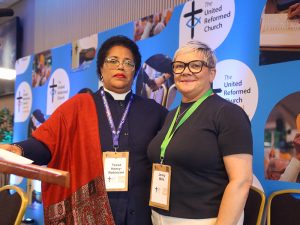
Stephen ended the worship by leading Assembly in a chorus of welcome as members warmly greeted each other.
Session one
Introduction and Greeting of Ecumenical Guests
The Revd Philip Brooks, Deputy General Secretary (Mission), introduced ecumenical guests from the UK and abroad. They were greeted by The Moderator of the URC General Assembly, the Revd Dr Tessa Henry-Robinson. This year’s guests are:
- The Right Revd Gordon Cowans, Moderator of the United Church in Jamaica and the Cayman Islands
- Pastor Markus Jäckle, Senior Church Councillor of the Evangelische Kirche der Pfalz, the Protestant Church in the Palatinate, Germany
- The Revd Dr Shaw James Paterson, Moderator of the General Assembly of the Church of Scotland
- The Revd Chantal Noppen, a Church of England vicar in the Diocese of Durham
- The Revd Tom Osborne, a superintendent minister in the Methodist Church
- The Revd Canon Dr Gale Richards, a regional minister of the Baptist Union of Great Britain
- Mrs Yvonne Campbell, General Secretary of the Congregational Federation
The Revd Dr Graham McGeoch, Mission Secretary (Discipleship and Dialogue) for the Council for World Mission, was unable to be present owing to illness.
Dr Henry-Robinson said that ecumenical guests are full members of Assembly, able to vote, and she invited two of them to address Assembly.
Pastor Jäckle spoke of the major challenges faced by Church and society across Europe. He wished for this Assembly “a clear view, open ear, warm heart and cool mind” in deliberations.
Dr Gale Richards said that while reflecting on the theme of “Ambassadors of Peace”, the recent gathering of the Baptist World Alliance in Lagos valued hearing different international voices speaking from their experiences. Similarly, she said, when we discern the mind of Christ at this URC General Assembly, we have an opportunity to receive “treasure” from different traditions.
Synod Moderators’ Report
The Revd Jamie Kissack, Yorkshire Synod Moderator, introduced the Synod Moderators’ report to Assembly and began by introducing four new members of the Moderators Meeting since General Assembly last met:
- The Revd Dr Michael Hopkins – Wessex Synod
- The Revd Lindsey Sanderson – National Synod of Scotland
- The Revd Kim Plumpton – Northern Synod
- The Revd David Salsbury – National Synod of Wales
At the heart of the report is the question “How does a church, clearly called by God, give voice to the living faith that is within us?” In that vein, each new Synod Moderator was challenged to give an account of their own vocation in two minutes.
In terms of what vocation and call meant to her, Kim spoke being committed to the role of the kingdom. That vocation is about coming to the table with little and allowing God to use what is brought for so much more and to venture into places one never thought would think go, relying on God’s strength to overcome any weaknesses. She also spoke about welcoming the mystery of God and not thinking we have to have all the answers as God will provide them.
“My response is to say here I am use me as you will,” Kim said. “That’s always felt the perfect place to be.”
Sharing his thoughts, the Dr Hopkins spoke about what he says when people ask him why took up the role of Wessex Synod Moderator. He said: “In a secular context [I say] because people asked me too, but I believe God asked me to through other people. I believe that my vocation at this point is to be a minister to ministers and friend of churches. I am fulfilling this role as a ministry. I can do nothing alone, but when I manage to work with God, sometimes a little bit gets done.”
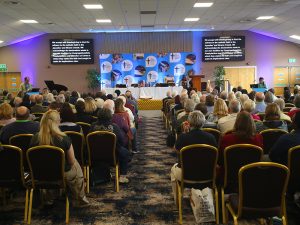
David shared how three things stood out for him: the first, listening to the still small voice of God whether in prayer or silence or the voices of others. Secondly, be curious about how the seeds of faith are nurtured within the communities within which you belong. He encouraged Assembly to “find places where your call can be shaped and nurtured where God has made a ‘you’ shaped space”. Thirdly, he said: “Be prepared to take risks. Have the courage to step out in faith and venture into God’s unknown. Choose to respond to God’s prompting and trust that God is with you.”
Lindsey shared that after concluding her first six months in her new role, she believed vocation to be a continuing journey of discipleship and how she felt being attentive to role and what it entails is a significant part in discerning vocation and being a faithful disciple.
Assembly was then invited to discuss the following three of four questions, continued within the report:
- How ready and effective are we at expressing our own commitment to being disciples of Jesus, and what might help us to be more effective?
- How does our way of life, our commitments and priorities, help or hinder other people’s openness to the Gospel?
- How does the way we live our life together in the church strengthen one another’s faith?
Assembly was then encouraged to ponder, in their own time, the ways that the answers to the first three questions were the same or different and how they might inform each other, and to give the answers attention within their own contexts.
Closed Session: A11 Reform
Session two
Ministries
The Revd Mary Thomas, Ministries Committee Convenor, presented Paper H11 which focuses on safer recruitment of those who lead worship in local churches and sets out the expectations for churches to safeguard their life and carry out safe recruitment processes for those who are not URC.
Lay preachers may be called upon to carry out a pastoral role when a Minister of Word and Sacraments is not available. As such, similar standards of integrity in their lives and relationships need to be adopted and thus need to be safely recruited. Ministries is already aware of this. Also, there are also times when URC services are led by worship leaders and preachers from outside the denomination. Most are in good standing with their own denomination and have been trained for their role. However, a standard and process for ensuring that such people are in good standing and have a current DBS needs to be in place.
Paragraph five and six of the paper outline the processes for safer recruitment for those from outside the URC invited to lead worship more than four times a year.
Mary noted that since the time of writing of the paper, the safeguarding legislation for Scotland had been updated which the Safeguarding Committee incorporate to update their processes, bringing a paper to Assembly Executive in 2025. It is not possible for those who are not Ministers of the Word and Sacraments who lead worship to have membership of the PVG scheme (Protecting Vulnerable Groups Scheme) unless they are carrying out regulated work as defined by the Disclosure (Scotland) Act 2020. What must be applied for is a Basic Disclosure (known as a Level 1 Disclosure in the new legislation). It is no longer possible to apply for a DBS for someone who is living in Scotland and carrying out the work requiring a criminal record check in Scotland.
Attention was brought to the Order Paper which contains an updated version of paragraphs 2.9, 4.5, 5.3b, 6.2b, and the last paragraph of Appendix 1
Questions for clarification – around is four times per year at one church what if its different churches. 6.3 what might the training and support be if the resolution is adopted. Support for church secretaries in undertaking the work of additional checks. Has any consideration been given to young people leading worship.
The convenor clarified that as these are guidelines, its down to local churches to incorporate the guidelines into their ways of work. The work of local church secretary was noted and the intent is not to overwhelm local staff but the paper is designed to further support local churches be safe.
The Ministries Secretary, Nicola Furley-Smith summarised the aim of the paper: to have well-equipped people leading worship in churches. Nicola also encouraged Assembly to encourage local churches to encourage lay people to undertake Assembly Accredited course which the URC pays for. Relevant training is contained within.
Concerns were expressed around the language of the paper, for example calling the paper’s recommendations “guidelines” and whether that means churches can continuing doing what they want, they way they want to, or should the “guidelines” form safer recruitment practice.
Following discussions, Resolution 35 passed.
Reporting team: Andy Jackson, Ann-Marie Nye, Steve Tomkins, Laurence Wareing. Pictures: Chris Andrews

